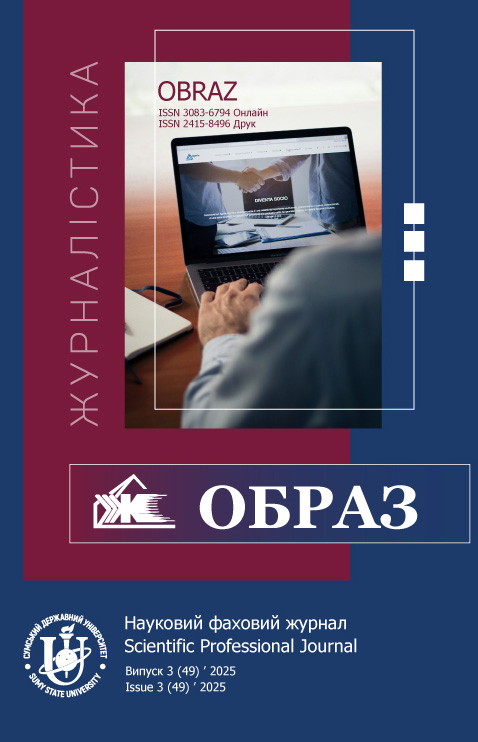Abstract
Introduction. In recent years, artificial intelligence (AI) has become a key driver of media transformation, reshaping the processes of news creation, analysis, and dissemination. AI systems automate routine operations, generate various types of content, and enhance audience engagement, thus expanding the possibilities of communication practices. The experience of the United States has been chosen as illustrative due to the influential role of American media in shaping global journalistic standards.
Relevance and Aim. The relevance of this study lies in the rapid implementation of AI in editorial processes, which is changing the work of journalists and the interaction between media and audiences. The aim of the article is to systematize the impact of AI on the functioning of U.S. media, assess its role in optimizing journalistic work and shaping new models of information presentation, and identify the risks and limitations of its application, including quality control, adherence to ethical norms, and maintenance of professional standards.
Methodology. The study applies analysis of scholarly publications, data from the Pew Research Center and Muck Rack, and case studies of AI implementation in Associated Press (AP), The Washington Post (WP), and Politico. Methods of systematization, comparative analysis, and content analysis are employed to identify key trends, benefits, and risks.
Results. The findings reveal that AI facilitates the automation of data collection and processing, fact-checking, and the preparation of analytical materials, thereby transforming newsroom operations and approaches to audience engagement. Examples from Politico, as well as AI experiments at AP and WP, demonstrate the growing integration of algorithmic solutions into editorial workflows. However, their effectiveness and impact on the quality of journalism require further research. Surveys of journalists and audiences indicate a cautious attitude toward AI and emphasize the importance of human oversight of final outputs.
Conclusions. The integration of AI expands journalists’ professional capacities, fosters new content formats, and increases the importance of adhering to ethical standards. These technologies are also reshaping information consumption practices and opening new ways for audiences to interact with media.
References
1. Hlazunov, O., Myronenko, V. (2025). The Role of Artificial Intelligence Tools in the Contemporary Mass Media Discourse of Ukraine. Mass Communication in Global and National Dimensions, pp. 14–17. URL: https://doi.org/10.5281/zenodo.15538112
2. Humeniuk, T. (2023). The Use of Artificial Intelligence in the Information Space: Philosophical Aspect. Ukrainian Information Space, (12), pp. 41–54. URL: https://doi.org/10.31866/2616-7948.2(12).2023.291164
3. Sulikovska, O. (2024). The Human as a Benchmark, Authorship, and Fact-Checking: How Ukrainian Media, Organizations, and State Institutions Use AI. Mediamaker. URL: https://mediamaker.me/lyudyna-yak-oriyentyr-avtorstvo-j-faktcheking-yak-ukrayinski-media-organizacziyi-ta-derzhstruktury-vykorystovuyut-shi-8438
4. Kharchenko, S. (2021). Artificial Intelligence and Literary Editing of Media Texts: Bifurcation Points. International Philological Journal, (1), pp. 121–125. URL: https://doi.org/10.31548/philolog14(4).2023.08
5. AP leading with AI. URL: https://www.ap.org/solutions/artificial-intelligence
6. Bauder D. (2023). AP, other news organizations develop standards for use of artificial intelligence in newsrooms. AP. URL: https://apnews.com/article/artificial-intelligence-guidelines-ap-news-532b417395df6a9e2aed57fd63ad416a
7. Brown P., Jaźwińska K. (2025). Journalism Zero: How Platforms and Publishers are Navigating AI. Columbia Journalism Review. URL: https://www.cjr.org/tow_center_reports/journalism-zero-how-platforms-and-publishers-are-navigating-ai.php
8. Caswell D., Fang S. (2024). AI in Journalism Futures. Initial Report. Open Society Foundations. URL: https://www.opensocietyfoundations.org/publications/ai-in-journalism-futures-2024
9. Deck A. (2024). The Washington Post’s first AI strategy editor talks LLMs in the newsroom. Nieman Journalism Lab. URL: https://www.niemanlab.org/2024/03/the-washington-posts-first-ai-strategy-editor-talks-llms-in-the-newsroom/
10. Deck A. (2025). Politico’s recent AI experiments shouldn’t be subject to newsroom editorial standards, its editors testify. Nieman Journalism Lab. URL: https://www.niemanlab.org/2025/08/politicos-recent-ai-experiments-shouldnt-be-subject-to-newsroom-editorial-standards-its-editors-testify
11. Esposito, E. (2022). Artificial Communication: How Algorithms Produce Social Intelligence. The MIT Press. URL: https://direct.mit.edu/books/book/5338/Artificial-CommunicationHow-Algorithms-Produce
12. Financial Times launches first generative AI tool for subscribers (2024). URL: https://aboutus.ft.com/press_release/financial-times-launches-first-generative-ai-tool
13. Lipka M. (2025). Americans largely foresee AI having negative effects on news, journalists. Pew Research Center. URL: https://www.pewresearch.org/short-reads/2025/04/28/americans-largely-foresee-ai-having-negative-effects-on-news-journalists
14. Gottfried J., Mitchell A., Jurkowitz M., Liedke J. (2022). Journalists sense turmoil in their industry amid continued passion for their work. Pew Research Center. URL: https://www.pewresearch.org/journalism/2022/06/14/journalists-sense-turmoil-in-their-industry-amid-continued-passion-for-their-work
15. Londoсo-Proaсo C., Buele J. (2025). Can artificial intelligence replace journalists? A theoretical approach. Frontiers. URL: https://www.frontiersin.org/journals/communication/articles/10.3389/fcomm.2025.1537146/full
16. Meir N. (2023). Introducing 5 AI solutions for local news. AP. URL: https://www.ap.org/the-definitive-source/products-and-services/introducing-5-ai-solutions-for-local-news
17. Munoriyarwa A., de-Lima-Santos M-F. (2025). Generative AI and the Future of News: Examining AI’s Agency, Power, and Authority. Journalism Practice. p. 2177-2188. URL: https://www.tandfonline.com/doi/epdf/10.1080/17512786.2025.2545448?needAccess=true
18. Paybarah A., Morse C. E., Baran J., O'Toole J., Uraizee I. (2024). 2024 election ads on immigration mislead voters. WP. URL: https://www.washingtonpost.com/elections/interactive/2024/republican-campaign-ads-immigration-border-security
19. Simon F.M. Artificial Intelligence in the News: How AI Retools, Rationalizes, and Reshapes Journalism and the Public Arena. Tow Center for Digital Journalism, p. 46. URL: https://towcenter.columbia.edu/sites/towcenter.columbia.edu/files/content/Tow%20Report_Felix-Simon-AI-in-the-News.pdf
20. Simon F.M. (2025). Rationalisation of the news: How AI reshapes and retools the gatekeeping processes of news organisations in the United Kingdom, United States and Germany. New Media & Society. URL: https://journals.sagepub.com/doi/10.1177/14614448251336423
21. Smarter, Faster Policy Insights – On Demand. PoliticoPro. URL: https://www.politicopro.com/pro-analysis/policy-intelligence-assistant-defense-report
22. The State of Journalism 2025 (2025). Muck Rack. URL: https://muckrack.com/research/the-state-of-journalism
23. The Washington Post launches “Climate Answers”. (2024). WP. URL: https://www.washingtonpost.com/pr/2024/07/09/washington-post-launches-climate-answers
24. The Washington Post Launches “Ask The Post AI,” a New Search Experience. (2024). WP. URL: https://www.washingtonpost.com/pr/2024/11/07/washington-post-launches-ask-post-ai-new-search-experience/
25. The Washington Post’s new AI tool featured in Axios. (2024). WP. URL: https://www.washingtonpost.com/pr/2024/08/20/washington-posts-new-ai-tool-featured-axios

This work is licensed under a Creative Commons Attribution 4.0 International License.

